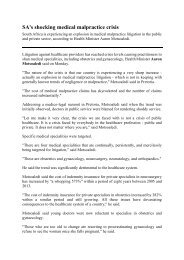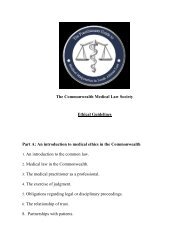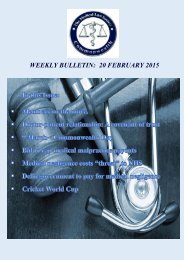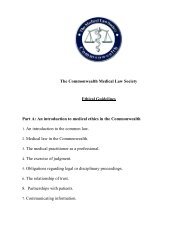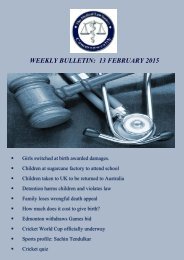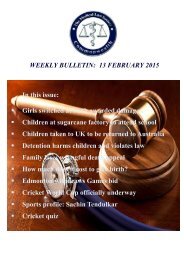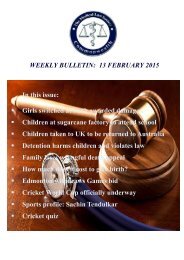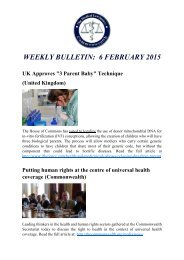o_19dfht06q16c2vsu1ute16tm75a.pdf
Create successful ePaper yourself
Turn your PDF publications into a flip-book with our unique Google optimized e-Paper software.
The Commonwealth Medical Law Society Guidelines<br />
Guideline 1: The Medical Practitioner as Expert Witness<br />
1. The duty of the expert witness should be to assist the court to administer justice.<br />
This duty should override any obligation to the party from whom the expert<br />
receives instructions or by whom the expert is paid.<br />
2. The expert stands in a position of considerable influence in regard to court<br />
proceedings, particularly those in which the expert’s evidence is in the nature<br />
of a professional opinion.<br />
3. The Court is entitled to expect that, as professionals giving expert evidence, the<br />
expert witness shall give an opinion which is unbiased and objective.<br />
4. The expert witness should exercise a high degree of diligence in the preparation<br />
of the expert report and the presentation of oral evidence.<br />
5. The expert witness should draw the attention of the court to any inconsistencies<br />
or anomalies in the evidence which the expert witness has become aware of.<br />
6. Expert witness should define their area of expertise in their report and when<br />
giving oral evidence, and should ensure that the opinion which they express<br />
falls within their area of expertise.<br />
7. The expert witness should immediately draw to the attention of the parties and<br />
to the court any change in the expert witness’s opinion, whether this occurs<br />
before or after the commencement of the expert witness’s oral evidence.<br />
8. The expert witness’s report should set out:<br />
8.1. Details of the expert’s qualifications, experience and accreditation.
8.2. Details of any texts, literature or other information relied on in the report.<br />
8.3. Contain a statement setting out the substance of all facts given to the expert<br />
which are material to the opinions expressed in the report, or upon which<br />
those opinions are based.<br />
9. Make clear which of the facts stated in the report are within the expert’s own<br />
knowledge.<br />
9.1. Say who carried out any examination, measurement, test or experiment which<br />
the expert has used for the report and<br />
(i)<br />
(ii)<br />
(iii)<br />
give the qualifications, relevant experience and accreditation of that<br />
person;<br />
say whether or not the examination, measurement, test or experiment<br />
was carried out under the expert’s supervision; and<br />
summarise the findings on which the expert relies<br />
9.2. where there is a range of opinion on the matters dealt with in the report, the<br />
expert should:<br />
(i)<br />
(ii)<br />
summarise the range of opinion, and<br />
give reasons for the expert’s own opinion.<br />
9.3. if the expert is not able to give an opinion without qualification, state the<br />
qualification.<br />
9.4. include such information as the court may need to decide whether the expert’s<br />
opinion is sufficiently reliable to be admissible as evidence.<br />
9.5. contain a summary of the conclusions reached.<br />
9.6. contain a statement that the expert understands an expert’s duty to the court,<br />
and has complied and will continue to comply with that duty.
10. The report should avoid unnecessary prolixity, particularly the unnecessary<br />
repetition of vast tracts of text. The report should distinguish between primary<br />
extrinsic date relied upon (such as hospital records, accident reports and the<br />
other primary source data) and secondary source information, such as the<br />
unproven version of witnesses.<br />
R v H 140 BMLR 59; [2014] EWCA Crim 1555.<br />
This is a case dealing with the use of expert evidence, and the undesirability of<br />
leading unreliable or inappropriate expert evidence. The case follows a trend in a<br />
number of jurisdictions in which expert evidence has come under increasing scrutiny<br />
by the courts (see eg. United Kingdom: Jones v Kaney - 119 BMLR 167 [2011]<br />
UKSC 13; Ndlovu v Road Accident Fund 2014 (1) SA 415 (GSJ)).<br />
The applicant was a general practitioner who had been convicted of various offences.<br />
The trial judge had refused to admit evidence of an expert which was in the<br />
appellant’s favour, and the applicant appealed. The appeal against conviction was<br />
dismissed. The court found that the trial judge had not erred in refusing to admit the<br />
evidence of the expert. The defence was entitled in appropriate cases to call expert<br />
evidence on a specific subject outside the knowledge and experience of the jury<br />
which might assist them in the task of assessing credibility and reliability. However,<br />
in the instant case, the trial judge had found that there was no evidence on which the<br />
jury could find that the complainant had 'recovered' or 'retrieved' memories during<br />
the treatment for her mental illness, and there was thus no basis for admitting the<br />
expert’s evidence of false memory syndrome, which would have had the effect of<br />
usurping the function of the jury in assessing the complainant's credibility as a<br />
witness.<br />
(Editor’s note: Of importance, the court (per curiam) expressed a real concern about<br />
the use of unreliable or inappropriate expert evidence in such cases. In the United<br />
Kingdom, the Criminal Procedure Rules 2014 and amendments to the Criminal<br />
Practice Directions made by the Lord Chief Justice came into force which<br />
incorporated certain reliability factors recommended by the Law Commission for<br />
the admission of expert evidence. When these changes occurred, a new and more<br />
rigorous approach on the part of the courts to the handling of expert witnesses was<br />
adopted. The intention was to avoid misunderstandings about what was (and what<br />
was not) appropriately included in an expert's report and so either avoid, or at least<br />
render far more straightforward, submissions on admissibility such as those made in<br />
the instant case. In particular, comment based only on analysis of the evidence which
effectively usurped the task of the jury was to be avoided. Part 33 of the Rules now<br />
includes an identification of the expert’s duty to the court as being: to help the court<br />
to achieve the overriding objective that criminal cases be dealt with justly by giving<br />
opinion which is objective and unbiased and within the expert’s area or areas of<br />
expertise. This duty overrides any obligation to the person from whom the expert<br />
receives instructions or by whom the expert is paid. The duty includes obligations to<br />
define the expert’s area or areas of expertise in the expert’s report, and when giving<br />
evidence in person. When giving evidence in person, the expert is obliged to draw<br />
the court’s attention to any question to which the answer would be outside the<br />
expert’s area or areas of expertise; and to inform all parties and the court if the<br />
expert’s opinion changes from that contained in a report served as evidence or given<br />
in a statement).




